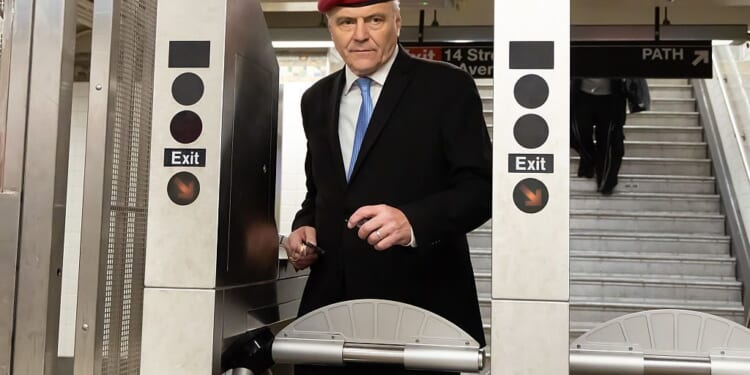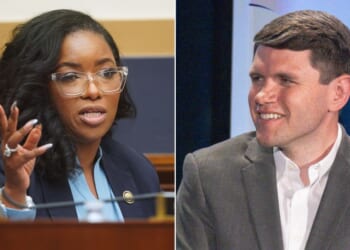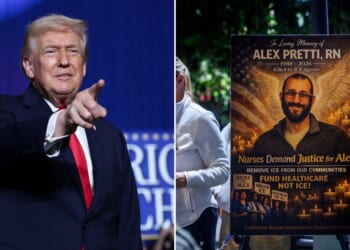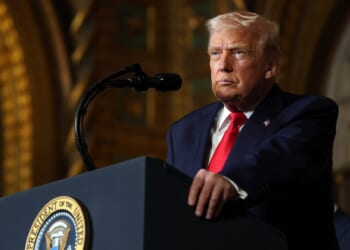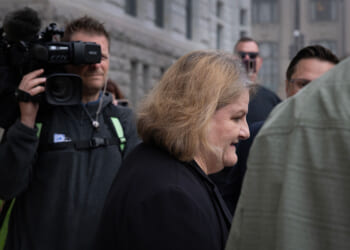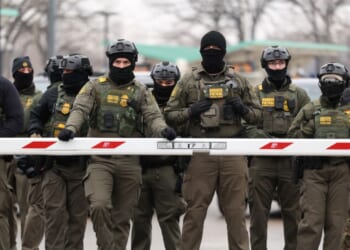It’s nearly 8 p.m. outside the Stop & Shop in the Glendale neighborhood of Queens, and Curtis Sliwa, the Republican nominee for New York City mayor, is in town. He is the guest of honor at the annual Glendale Halloween parade — the longest-running Halloween parade in the Big Apple — to present the prize for best costume.
This isn’t the kind of neighborhood where Zohran Mamdani, the Democratic nominee, would thrive. Buildings rarely exceed three stories, and the streets are lined with repair garages, laundromats, and mid-price food stores. It’s more blue-collar, Catholic, and Trumpy than the rest of the city, where Latino immigrants mix with older white-ethnic families with surnames like Temkin and Kowalski.
In his trademark red beret and a crisp blue suit, Sliwa looks rather tame compared to those standing next to him: a KFC chicken, two baby dinosaurs, one ghost, and several Minions. In some ways, though, the scene is the perfect encapsulation of his campaign: comical, attention-grabbing, even endearing — but fundamentally unserious. Even so, to dismiss his bid as a sideshow ignores the very real effect he has had on this race.
Crucially, he has thrust issues like subway safety and public order into the spotlight, giving voice to outer-borough New Yorkers disillusioned by the choice between a socialist newcomer and a disgraced former governor. And by rebuffing former mayors, hedge-fund billionaires, and establishment Democrats who have been calling on him to step aside, he’s also exposed the anti-democratic maneuverings of the city’s elites, winning him respect on both sides of the aisle.
Critics argue that by refusing to drop out, Sliwa has paved the way for New York’s first socialist mayor. But as I trailed Sliwa last weekend — from the GOP’s HQ in deep Staten Island to Greenwich Village, Manhattan, and then Astoria, Queens — many of the people I spoke with had no intention of backing either Cuomo or Mamdani, regardless of whether Sliwa remained on the ticket. Few said that they could bring themselves to vote for a governor who supported cashless bail, took away qualified immunity for cops, and undercounted nursing-home deaths during the pandemic. For them, it’s Sliwa or nothing.
“I have the same net favorability as Barack Obama,” Sliwa tells me after the Halloween parade. “Obama was loved by Democrats — and I’m loved in New York.” At six feet, the square-jawed 71-year-old still cuts an imposing figure, even if the costumed children playing nearby somewhat undermine that image.
“I’ve been shot, stabbed, and beaten on these streets, but the people love me,” he adds. “It’s like the TV program Everybody Loves Raymond, except it’s called Everybody Loves Curtis.”
A lot of people do love Curtis — and have done for many decades. Sliwa first caught the public eye in 1970, when, as a 16-year-old paperboy delivering the Daily News to his neighbors in Brooklyn, he spotted a building on fire. Without hesitation, he rushed inside and rescued several people, a feat that earned him an “International Newspaperboy” award — and even a visit to the White House.
That early brush with heroism gave Sliwa his first taste of public adoration and a lasting commitment to civic engagement, which eventually led him to establish the Guardian Angels at age 23. The group, originally known as the “Magnificent 13,” was formed in response to New York City’s soaring murder and crime rates in the 1970s. They would patrol the subways to promote public safety, acting as unarmed civilian watchdogs to prevent crime.
They didn’t have much of an impact on the city’s crime levels, but their distinctive red berets and bomber jackets provided a sense of security to New Yorkers. Then-Gov. Mario Cuomo was a fan, remarking at the time that the Guardian Angels were a “better expression of morality than our city deserves” — a comment his son may not appreciate today.
Members of the group, mostly Latino and African-American, were unarmed but trained in karate. Sometimes, however, the bigger threat came not from would-be criminals, but the police. NYPD officers didn’t take kindly to these wannabe-cops patrolling their streets, and often there were clashes between the two groups. In 1981, a police officer fatally shot a Guardian Angel after mistakenly seeing a threat in him unzipping his jacket to show the group’s emblem.
Yet nothing did quite as much to damage the group’s credibility as when the founder, Sliwa, confessed that many of the Guardians’ tales of heroism proved to be untrue. “I was wrong, but we were in a sprint for survival,” Sliwa claimed in 1992. “We were just little people trying to get recognition for doing good work. In a sense it was like being Don Quixote.” The Guardian Angels are still around, but their visibility has waned since those reputational hits.
“He’s … exposed the anti-democratic maneuverings of the city’s elites, winning him respect on both sides of the aisle.”
Sliwa’s supporters remember those days fondly. It’s the reason so many of them support him now. “He protected the people when the city wouldn’t do anything,” said one Glendale resident. “His heart has always been in the right place.” Even in deep-blue Manhattan, Sliwa was treated more like a beloved court jester than a political enemy. “I don’t support Sliwa or any of his policies,” said one resident. “But he is entertaining.”
Sliwa acknowledges that the “love” he gets hasn’t yet turned into votes. The latest RealClearPolitics poll of polls has him at 17% — the lowest vote share of any Republican mayoral nominee in 40 years — and nearly 20 points behind Mamdani in first place. “There is fear and fright hanging over this election,” he says in his gruff Brooklyn accent. “This is the most dystopian election I’ve ever seen. … Cuomo’s an angry curmudgeon predicting the end of the world, which guilts people into voting for him.”
This race is Sliwa’s second bite at the cherry. In 2021, Eric Adams, a former cop and a Democrat, trounced him by nearly half a million votes. Dogged by corruption allegations, Adams has dropped out and endorsed Cuomo. Pressure on Sliwa to follow suit has come from the soon-to-be-former-mayor, billionaires like Bill Ackman and John Katsimatides, several local newspapers, and Cuomo himself.
Sliwa has — thus far — refused to back down, saying that he would only exit the race if “they figure out a way to put me in a pine box and bury me six feet under.” In Sliwa’s mind, he is a Republican standing on the Republican ticket. If anyone should drop out, it should be Cuomo, who, after all, lost the Democratic primary to Mamdani and chose to run as an independent. “Cuomo would put the last nail in the coffin of New York City like he did in destroying New York state,” he tells me. “Then he fled, fearing impeachment from his own Democrats, and then hung out with his billionaire friends in the Hamptons until he decided to somehow revive his career by trying to be mayor.”
Nevertheless, if Sliwa were to drop out, his chunk of votes might put Cuomo within striking distance of Mamdani, who is running a campaign far to the Left of either candidate. Public grocery stores, a $30 minimum wage, universal childcare, and free public buses make Mamdani’s proposals more radical than either Cuomo’s or Sliwa’s — but the need to save Cuomo doesn’t seem to trouble the Republican’s supporters. “He’s a lifelong New Yorker; he lives, breathes, and loves New York,” says Richard Huber, a Queens local. “Choosing between Cuomo and Mamdani is like choosing between cyanide and death by hanging.”
To his detractors, though, this stubbornness is vintage Sliwa, a character streak (or flaw) that has stuck with him since high school. Even then, he clashed with authority: he was expelled from Brooklyn Prep, a Jesuit school, for refusing to fulfill the school’s jacket-and-tie requirement. He then dropped out of his next school, Canarsie High School, because all the kids were “doing acid and smoking reefer.”
In adult life, this intractability has led to more serious, nearly lethal, consequences. During his career as a popular New York radio host in the 1980s and ’90s, Sliwa regularly attacked mobsters like John Gotti, who went to trial for charges including racketeering and murder in 1992. After Gotti’s conviction, three men jumped Sliwa outside his apartment, breaking his wrist and elbow. The next morning, he was back on air, adding Gotti’s son to his list of polemical targets.
But that meant the next punishment was more severe: two months later, he climbed into a cab near his home — only for a gunman to spring from the front seat and shoot him in the groin and legs. Sliwa hurled himself out the window of the moving car, later recalling the sting of “pebbles shooting into my face off the tires.” Compared to that, Sliwa tells me, “a mayoral race ain’t so bad.”
When the cameras are off, Sliwa seems frail. His head swivels like a restless figurine, and his hands tremble. A sharp tan line from his beret cuts across his forehead, lending it a weathered, sun-beaten look. All this was on view moments before Sliwa appeared on stage at the GOP Staten Island rally. But once the show started, the radio persona emerged. “Cuomo’s like the grim reaper — he’s so cold-hearted,” he warned. “He’s a dirtbag.”
Sliwa clearly relishes his time in the limelight. Over the course of the campaign, he’s delivered some of the most memorable lines — Cuomo “slapping fannies and killing grannies,” in reference to the nursing-homes scandal and sexual-abuse allegations — and telling Mamdani, in Gen Z-speak, to stop “glazing him.” This is why Sliwa has won himself a cult following online, some of it driven by Mamdani’s supporters.
But on a deeper level, Sliwa’s attacks on the Democratic establishment and the donor class have tapped into a very real anger that many New Yorkers feel toward the city’s elites. Amid record inequality and a persistent affordability crisis, that resentment helped fuel support for President Trump in the 2024 election. It’s a sentiment Mamdani has also capitalized on, despite sharing almost no ideological ground with the former president.
“This stubbornness is vintage Sliwa, a character streak (or flaw) that has stuck with him since high school.”
Ironically, Sliwa takes inspiration from Mamdani for his own campaign. Despite struggling to pronounce his first name (Zor-han instead of Zoh-ran), he commends Mamdani for coming from “almost zero” in the Democratic primary to beating Cuomo. “That’s why I say you can’t believe the polls,” he says. Many of his voters seem to agree, as does another well-known Republican, Rudy Giuliani.
At the Staten Island rally, Giuliani appeared by Zoom to say, “When I first ran for mayor, I lost by 1% when the polls had me down by 12. And the second time, I was down by six and I won,” said Giuliani. “So don’t give up! Curtis is the best candidate by far.” The speech, however, had a slightly tragicomic quality to it, reminiscent of when Giuliani ended up hosting a news conference at Four Seasons Total Landscaping instead of the hotel after Trump’s 2020 loss. A combination of patchy connection and poor audio forced Sliwa’s handlers to hold a laptop up to a microphone so people could hear the former mayor speak.
Giuliani, along with former New York Gov. George Pataki, is Sliwa’s role model. As mayor, Giuliani revitalized the city and presided over a significant drop in crime. He was also fairly liberal on social issues like gay marriage and gun rights. Sliwa, for his part, has run a conventional conservative campaign focused on public safety and promising more police officers on the streets. The only difference is that he’s also running on an anti-animal-cruelty platform, which includes a ban on kill shelters.
I ask Sliwa whether he should be following in Giuliani’s footsteps to broaden his appeal to New York’s liberals. “I am very liberal!” he exclaims. “Well, not a liberal, but I’m liberal in some things, like gay marriage and gun rights. I also don’t like Medicaid and food stamps being cut back. There are poor people who will be hurt by this.”
Sliwa has also criticized his own party for vilifying Muslims. With the likes of Laura Loomer, Steve Bannon, and even the president himself fretting about the Islamization of New York (Mamdani is a Shiite Muslim), Sliwa defends the city’s almost million-strong Muslim community. “I condemned the national Republicans early on,” he says. “I told them: you’re attacking the Muslim religion and the way the culture is, like, eating with your fingers. I told them to back off, because Muslims are very conservative. They’re even way too conservative for me!”
Labeling himself a “populist but not MAGA,” Sliwa believes that one of the reasons Trump has not endorsed him is because he can’t be put in a “cookie-cutter box.” “You never know the position I’m going to take because I’m open-minded,” he says. I ask him what, if any, issue he has changed his mind on. He takes a long pause. “Well, there’s still some issues I haven’t quite come to grips with. Obviously, I don’t want sex-change surgery for teenagers,” he says. “But for adults, I haven’t come to a conclusion yet. I’m not opposed to it, but I really think it’s really more of a private concern.”
A large number of New Yorkers may never forgive Sliwa for staying in the race. But as the Republican nominee, why should he? It isn’t his responsibility to champion a Democrat, let alone one accused of sexual abuse by multiple women. And unlike Cuomo, Sliwa actually won his party’s primary.
There is also something oddly endearing about this aging street tough. He is a classic New York eccentric, the last of a dying breed of why-I-outta fighters with a surprisingly big heart (at one point, he was fostering 16 cats). He’s shown a willingness to buck the Republican line on a range of issues and cares a great deal about the city he’s spent his whole life in. After Tuesday’s election, the Everybody Loves Curtis show will be over, and with it, an older New York will fade away — for good and ill.

